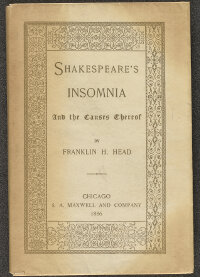Franklin H. Head
Chicago: S. A. Maxwell, 1886
This short jeu d’esprit (72 pp.) presents insomnia as the “chronic terror of all men of active life who have passed the age of thirty-five or forty years,” a product of “cares and perplexities of life” and true of our ancestors, even before the days of “telegraphs and railroads,” “working steam and electricity,” and the “mad race for fame and wealth” characteristic of America. Shakespeare can be trusted as evidence of insomnia in the past, on account of “unequalled power of observation” and “ability accurately to chronicle his impressions”: he is “the only man ever born who lived and wrote absolutely without bias or prejudice.” Head cites Emerson: “he reported all things with impartiality.” Quotations from Shakespeare’s plays about sleeplessness reveal reveals his own “hours of pathetic misery, his nights of desolation.” Fictional letters from Will Kemp, Nicholas Bottom, Mordecai Shylock, and other contemporaries both real and imagined are presented as evidence that Shakespeare was kept awake by anxiety about investments, debts, and marital problems. —PG
